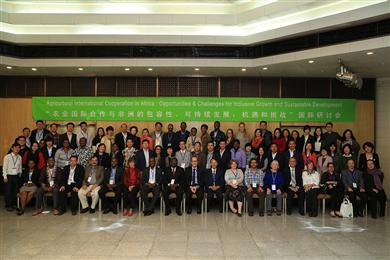On 13-14 October 2014 in Beijing, the Centre for African Studies of Peking University and Oxfam Hong Kong held the International Conference on Agricultural International Cooperation in Africa: Opportunities and Challenges for Inclusive Growth and Sustainable Development. The conference enabled in-depth discussion about the opportunities and challenges of international agricultural cooperation and possible paths to sustainable and inclusive development in African countries. Academic exchange in the field, both in China and abroad, was enhanced.
More than 80 delegates attended from across China and around the world, including Chinese officials from the State Council, Ministry of Commerce, China Development Bank, Ministry of Agriculture, Ministry of Environmental Protection and Office of Poverty Alleviation and Development, a number of scholars from institutes and universities in China and abroad, representatives from the China Enterprises Association, Chinese companies, international organisations, and various experts from Brazil, India, Kenya, South Africa, United States, Zambia, Zimbabwe.

International Conference on Agricultural International Cooperation in Africa: Opportunities and Challenges for Inclusive Growth and Sustainable Development
Professor Anshan Li, Director of the Centre for African Studies of Peking University, Mr. Steve Price-Thomas, Deputy Advocacy and Campaigns Director for Oxfam International, and Said Adejumobi, Southern Africa Regional Office Director of the United Nations Economic Commission for Africa delivered the opening addresses.
Discussions during the two-day conference focused on such topics as agricultural cooperation with Africa, foreign investment in Africa, endogenous agricultural development, economic growth, land issues, the opportunities and challenges of having international stakeholders and methods through which impacts on non-agricultural investment can be measured in terms of sustainable development.
Many participants felt that despite Africa’s economic growth in recent years, its agricultural industry remains the least internationalised – yet, they and many others see great potential, and more and more international investors are becoming interested in agricultural cooperation in Africa. Through aid, trade, and development, investors from developed countries, developing countries, and from within Africa are exploring opportunities in Africa.
African countries are also aware of the potential. To prepare for development opportunities, some nations have developed financial systems, environmental infrastructure, land management systems, and methods to attract foreign personnel. While these opportunities can bring new investments and cooperation of different types, significant attention should be given to what benefits will be for African countries. A diversity of products, for example, is important, as is access to target markets, and a high value of goods – these help contribute to inclusive and sustainable development and thus to poverty alleviation.
During the case studies section of the conference, representatives shared cases from countries such as Ethiopia, Mozambique, South Africa, Tanzania, Zambia, and Zimbabwe.
